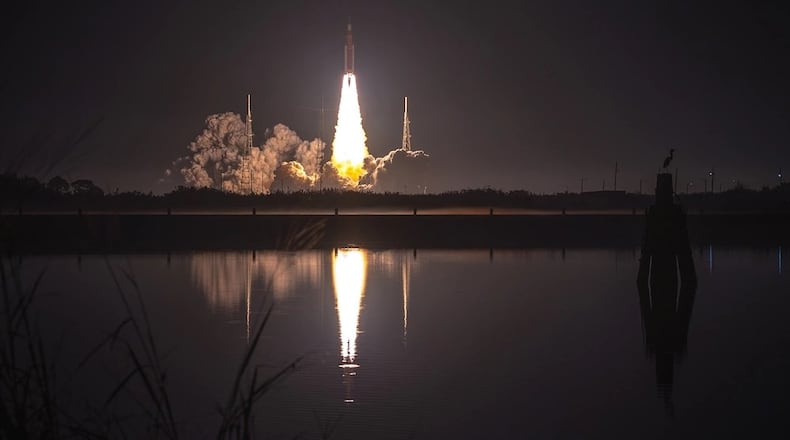Free said NASA and its contractors need to aim for better performance while keeping the inherent risk of traveling in space in view at all times, adding: “We don’t have that budget level. That’s absolutely not an excuse.”
NASA funding has been in the news recently. Last month, a report from the National Academies of Sciences, Engineering, and Medicine said the agency has been operating with a mismatch of objectives and funding.
“Congress, and the nation need to make some difficult decisions about priorities in order to rebuild the foundations for NASA’s continued success,” Norman Augustine, retired CEO of Lockheed Martin, said at the time of the report’s release.
“We don’t really talk about how hard it is,” Free said at Wright State, referring to the dangerous work of space travel. “We make it look easy.”
“Triple down on the resources,” said Gen. Michael Guetlein, vice chief of space operations for the U.S. Space Force, agreeing with Free, with whom he appeared on a forum panel moderated by Elaine Bryant, a Dayton Development Coalition executive vice president for aerospace and defense.
Unfortunately, NASA funding may not become a priority until there’s a national crisis or until a competitor in the new global space race announces that it will land on the moon in six months, Guetlein and Free said.
But what determines when the United States can put astronauts on the moon are funding decisions made years earlier, Free emphasized.
“Somebody is going to say to us ... ‘What can you guys do? When can you land?’” Free said. “That decision was three years ago. And that could have been changed. It’s not six months before somebody else does it. Frankly, I’d love to say it’s today, but it was probably six, eight, nine, 12 months ago for us.”
“I’m not saying we’re not going to get there,” he added. “I’m just telling you, these decisions, these (take) years, and it’s worse for the DOD (Department of Defense). The DOD should always be a higher priority than us.”
“But there are years when, the discretionary budget, our budget just hangs for two years in a row, and we’re just holding on for dear life trying to make it through ‘24 and ‘25,” he said.
NASA’s fiscal year 2024 budget was $24.8 billion, about a 2% cut from 2023.
Organized by the Dayton Development Coalition and JobsOhio, the forum explores the defense and aerospace sectors, economic areas crucial to the Dayton area and Ohio.
Wright-Patterson Air Force Base, home to much of the Air Force’s acquisition, intelligence and research muscle, boasts a $16 billion economic impact to the region, noted Jeff Hoagland, the coalition’s president and chief executive.
Sen. Sherrod Brown, appearing at the forum, praised the work at Wright-Patterson, and noted the presence of NASA Glenn in the Cleveland area as well as key Air National Guard missions in Springfield, Mansfield, the Columbus area and elsewhere.
“What all of you do for a living will ensure that Ohio workers have good-paying jobs,” Brown said.
Hoagland asked for a moment of silence for former U.S. Rep. Dave Hobson, a longtime advocate for Wright-Patterson, Springfield and Greene County. Hobson died Sunday.
U.S. Rep. Mike Turner, R-Dayton, could not attend the first day of the forum, but he released a statement on Hobson, saying in part: “I saw firsthand how much Dave loved Ohio and the Miami Valley during our time together in the House of Representatives. Dave served in the Ohio Air National Guard and cared deeply about our service members and the safety and security of our country. He approached every challenge with tenacity and grace and was a friend to to all who knew him.”
The forum continues Tuesday at Wright State.
About the Author


